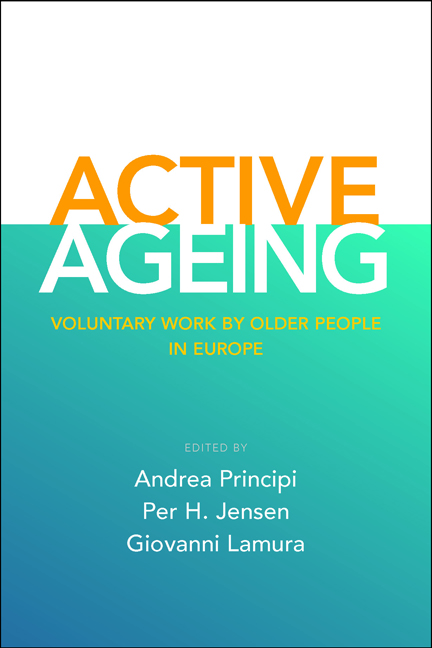Book contents
- Frontmatter
- Contents
- List of tables and figures
- Notes on the contributors
- Acknowledgements
- Foreword
- Part I Realising volunteering by older people in Europe An overarching approach
- Part II Opportunities and restrictions for older volunteers National experiences
- Part III Opportunities and restrictions for older volunteers Case studies in European voluntary organisations
- Part IV Conclusions
- Index
two - Volunteering in older age: a conceptual and analytical framework
Published online by Cambridge University Press: 05 March 2022
- Frontmatter
- Contents
- List of tables and figures
- Notes on the contributors
- Acknowledgements
- Foreword
- Part I Realising volunteering by older people in Europe An overarching approach
- Part II Opportunities and restrictions for older volunteers National experiences
- Part III Opportunities and restrictions for older volunteers Case studies in European voluntary organisations
- Part IV Conclusions
- Index
Summary
Introduction
In this chapter we present the general conceptual and analytical framework adopted in this volume to explore the issues associated with volunteering in older age. The proposed framework, which draws on existing literature, represents an attempt to integrate the relevant dimensions identified in Chapter One and is used as a reference throughout the book. A starting point for our considerations is, as anticipated in the previous chapter, that voluntary work has lately gained in prominence and importance across the world. Since the United Nations (UN) declared 2001 the International Year of Volunteers, awareness campaigns encouraging voluntary work have primarily been addressed at the general public, while more recent attempts to encourage volunteering have targeted older adults. In Europe, older adults are increasingly considered to be a resource that can be drawn on by the voluntary sector, and the establishment of the European Year of Active Ageing and Intergenerational Solidarity in 2012, following the Year of Volunteering in 2011, clearly shows how efforts in this respect have been growing. Moreover, organisations such as the European Older People's Platform (AGE) have been promoting volunteering among older people as a tool to enable them to continue to participate in society and to better cope with daily life (AGE, 2007).
Volunteering has thus become a mantra for active and healthy ageing, although it is not always clear what it is all about. As anticipated in the previous chapter, basically, volunteering expresses itself as a relationship between two actors: a volunteer, who, as a provider gives his/her time freely to help or support others, and a client or recipient, who accepts the services provided by the volunteer (Haski-Leventhal et al, 2009, p 149). Accordingly, voluntary work may be defined as unpaid help or support given to another person who is not a member of one's family. This gift relation between the volunteer and recipient is freely chosen rather than being based on coercion, subordination or dominance, and both partners are expected to gain from the relationship. The recipient gets an unfulfilled need fulfilled, while the benefits from volunteering are numerous and include: strengthening of the social inclusion of the helper/provider, reduced loneliness and improved physical and psychological well-being (Wilson, 2000; Haski-Leventhal et al, 2009, p 140; Tang et al, 2010).
- Type
- Chapter
- Information
- Active AgeingVoluntary Work by Older People in Europe, pp. 21 - 44Publisher: Bristol University PressPrint publication year: 2014

